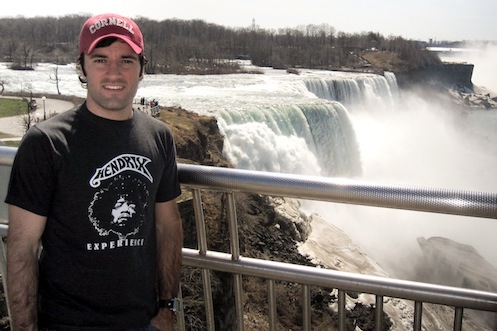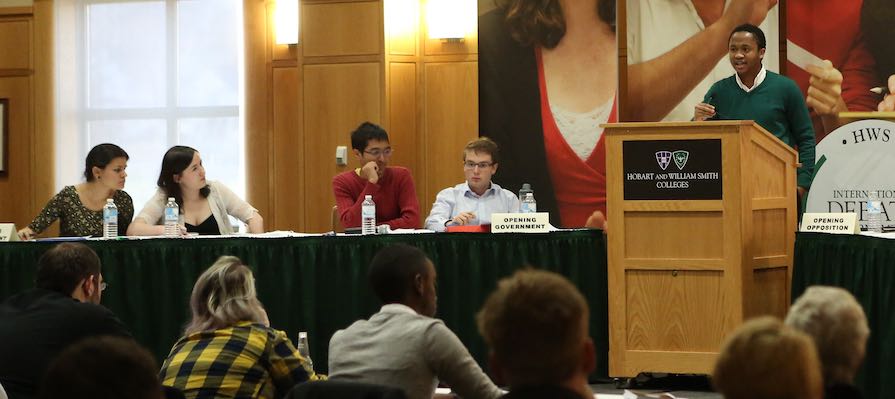Round Robin Debate Tournament
-
Round Robin Vision Statement
Hobart and William Smith Colleges aim to bring together an elite and internationally diverse group of debaters and adjudicators each year for a weekend of debate at the highest level. The tournament will be held in the WUDC debate format, set up in a pre-paired round robin we created, where every team debates against every other team exactly once before finals.
Our goal is to facilitate great debating and to recognize the skills and accomplishments of great debaters and adjudicators by treating them to a weekend of satisfying debate and superb hospitality. We aim for the HWS RR to be a crucible of research about debating and judging, and an incubator of ideas on how to make the activity of debating better.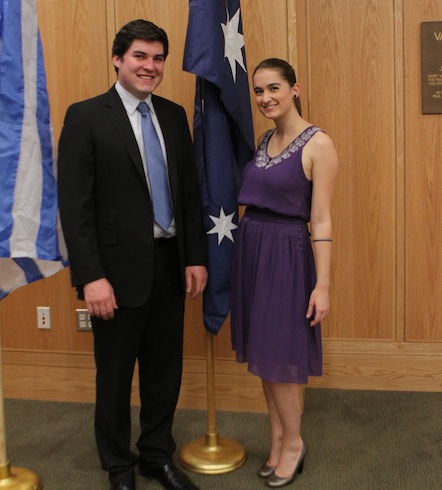
Schedule
The Round Robin is held annually in early April. The first day is the arrival day, with an excursion and welcome dinner. We hold six debate rounds and a keynote lecture over the following two days.
detailsJudging
The core of any great tournament is having great judges. Our goal is to provide two panels of WUDC-break-level judges for each debate. This increases accuracy and fairness, and it makes judging more fun too.
detailsPolicies
Running a Round Robin works a bit differently. Most of our policies are not surprising, but here are the details of our expectations of debaters and judges, along with how we run the tab.
details -
Excursions
A trip to Niagara Falls is included in the tournament for teams that arrive early. Teams from other countries may also want to visit Washington D.C. or New York City before or after the Round Robin!
detailsMeals and Parties
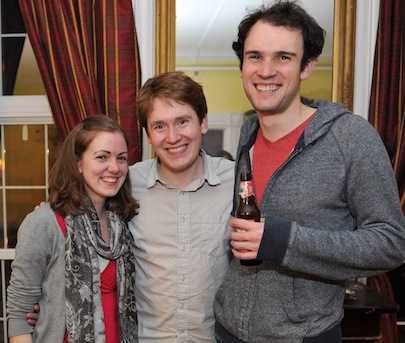
Because we invite only a selected group of debaters and judges, we can afford to really pamper our guests.
All the meals have wonderful food either at an elegant local restaurant or catered on campus. The Friday night social is an classy affair with hot hors d'oeuvres and a wide selection of wines from the hundreds of wineries in the Finger Lakes region.detailsKeynote Speakers
RR speakers have included Nadine Strossen, Chen Guangcheng, Jules Coleman, Bob Shrum, Larry Summers and many other exceptional individuals.
detailsAffiliated Tournaments
Teams that participate in Round Robin will also have the opportunity to participate in Colgate Open and the US Universities Debating Championship.
details -
Included in Registration
Qualifying
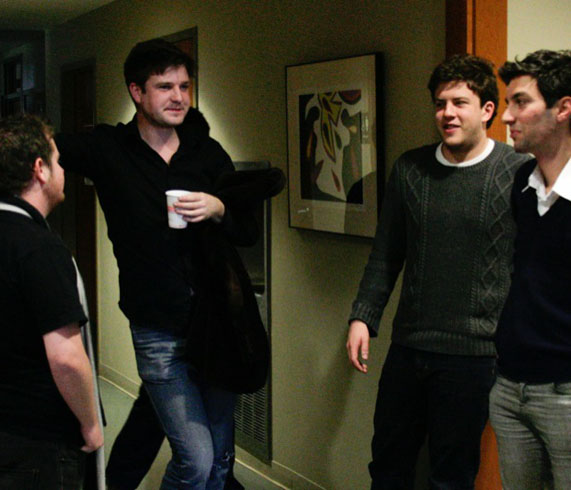
Two Ways to Qualify
Sixteen teams get an automatic invitation and those spaces not taken by these teams are given out to teams who apply for an at-large spot.
detailsDates and Deadlines
To make sure everything works smoothly and fairly, we need to stick to our deadlines. So check them out and don't miss them.
detailsCost and Financial Assistance
Our goal is to allow all qualified teams an opportunity to attend, so we have a limited bugdet for travel subsidies.
details -
Previous Winners
See a list of tournament champions, runners-up, finalists, top three speakers and honored adjudicators since the tournament began back in 2007.
detailsCommittee Members
Motions, Selections, Advisory
The RR requires help from around the world to be successful, and these are the people who have contributed over the years. Current committee members are listed on our Facebook page.
details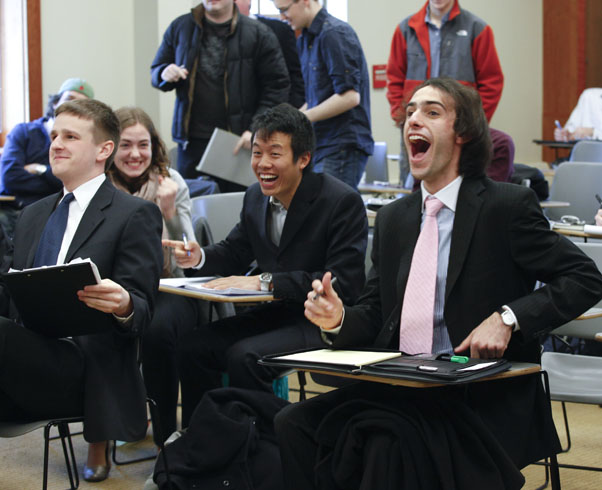
Origin Story
Every big event has a story behind it. Read about how the HWS Round Robin came into existence and how it developed over the years into the major debating event that it is today.
detailsVideos
Here are videos of the final rounds from past years. We started videotaping most preliminary rounds in 2013 and many of those are available on our YouTube channel.
details -
How to Find Us
View Larger MapConvenor
Prof. Eric Barnes
Philosophy Department
Hobart and William Smith College
Geneva, NY 14456
Phone: +1 315 781 3182
Fax +1 315 781 4575
E-mail: barnes@hws.eduPromotional Video (being updated)
You can also view or download our video here.
-
Privacy Policy
Anything said in confidence will be kept in confidence. We record and broadcast many of our debates, unless debaters specifically request that we not do so in accordance with the following policy. Policy on Rescinding Consent:
All preliminary rounds and oral adjudications will be recorded, as you consented to during the registration process. Our current policy on withholding consent is as follows.
• Each team is entitled to withhold consent from one round without being asked for justification, provided this is done prior to the start of the next round. (Use the e-mail address above.)
• There is no limit to the number of rounds in which teams can revoke consent to publish, but if this is more than the one round as just described, you will be asked to justify each revocation.
• If consent is revoked for a round, then that video will not be made public and will only be used for only research in a manner such that no content could be tied to any particular speaker.
-
Read More

Primary Features of the HWS Round Robin
• Top notch domestic and international competition
• An unbelievable judging pool, with two panels in each room
• Perfectly fair pairings & guaranteed on time rounds (due to the pre-paired round robin format)
• Amazing trophies you'll actually want to keep
• Great food at every meal (Really, this is no exaggeration.)
• Quality hotel accommodations
• Wine tasting social featuring numerous local wineries
• Delicious awards banquet
• Distant teams may be able to combine this tournament with other tournaments on adjacent weekends
• We also offer a trip to Niagara Falls to those who arrive early enough.
• Each year we bring in a highly renowned speaker specifically for the Round Robin -
Schedule (subject to change each year)
Friday
9:00 - 5:00 pm Optional excursion to Niagara Falls (Departs HWS @ 9am and from BUF airport at 11:30am)
7:00 pmWelcome Dinner
9:00 pmSocial - A Night on the TownSaturday
7:30 - 9:00 amBreakfast at your hotel
9:25 am Roll call in Sanford Room (teams dropped @ 9:30)
9:30 - 9:45 amWelcoming Remarks
9:45 - 12:00 pmRound One
12:00 - 1:15 pmLunch
1:30 - 3:45 pmRound Two
4:00 - 5:30 pmKeynote Lecture
5:45 - 7:15 pmKeynote Dinner (Faculty Dining Room)
7:30 - 9:45 pmRound Three
10:00 - 12:30 amWine Tasting SocialSunday
7:30 - 9:00 amBreakfast at your hotel
9:25 am Roll call in Sanford Room (teams dropped @ 9:30)
9:45 - 12:00 pmRound Four
12:00 - 1:15 pmLunch
1:15 - 3:30 pmRound Five
4:00 pmBreak Announcement & Final Round Motion Announced
4:30 - 6:00 pmFinal Round
6:30 - 8:30 pmBanquet and Awards Presentation
-
Funding and Acknowledgements
IDEA
The Round Robin would not be what it is today without the very generous support that was provided by the International Debate Education Association from 2008 to 2013.HWS
Since 2004 and the creation of the HWS Debate Team, the administration of Hobart and William Smith Colleges has been incredibly supportive of the debate team and of the Round Robin.Open Society Foundations
Major funding was also provided by the Open Society Institute's Youth Initiative (2008 - 2013). -
Geneva, NY

Located on the northern shore of Seneca Lake
Geneva is a small city in upstate New York that is home to Hobart and William Smith Colleges. Geneva is within driving distance of major Northeastern cities like Toronto, New York City, Boston, Philadelphia, Montreal and Washington D.C. -
Round Robin Tournament Policies
Debating Rules
- • Except as explicitly noted, the rules for this tournament are the same as those for the WUDC.
- • Each debater should accept 2 points of information. A debater’s failure to accept 2 POIs during her speech should be considered as a negative, and failure to accept any POIs will be seen by the judges as a significant flaw.
- • The model may not be ‘place set’ unfairly or without good reason. If the Opening Government team wishes to set the model in a particular geographical region, then this must be a region that the other teams could reasonably be expected to know about and the Opening Government must explain why placing the debate in this region makes for a better debate. Keep in mind that this is an international tournament.
- • The debater who is speaking should not allow debaters to remain standing for more than 30 seconds waiting to offer a point of information. Either clearly decline the point or accept it within that timeframe.
- • Timekeepers will bang once at 1:00, once at 6:00, twice at 7:00, and continuously starting at 7:15. Speeches over 7:30 will be penalized substantially.
General Policies
- • Any comments or complaints about judging should be directed to the chief adjudicator, or to the equity officer, as appropriate. All comments are appreciated and will be kept anonymous.
- • Rounds should start promptly at their appointed times, 15 minutes after the motion is announced. Any delay of 5 minutes or more should be reported immediately to the Tab Room.
- • If a team is late for any round, we will not hesitate to replace them with a swing team and assign them zero points for that round. We are committed to running on time.
- • In order to limit the influence of bias into the decisions, teams in preliminary rounds will be referred to by their code. We ask that you avoid discussing with your judges what school you are representing. Obviously, judges will sometimes know where debaters are from, but we will nevertheless attempt to minimize the potential influence that this might have.
- • Because of the round robin format, it is literally impossible to adjudicate two rounds and not see one team twice. We do not consider it to be a significant problem if you judge a team twice, but we will avoid having you judge any team more than twice. In the end, we’ve concluded that consistently strong adjudication panels are more important than more varied judging panels. So, we have chosen to use a small and selective judging pool instead of a larger judging pool. Despite these constraints on judge placement, we will also do our best to assign judges so that no two judges are on the same panel more than once.
Adjudication Expectations
- • Adjudicators should expect closing teams to continue to endorse and promote good arguments made by the opening teams. Failure to do this suggests that they are unaware that these arguments were good, which reflects poorly on them
- • Adjudicators should expect all debaters to accept and offer points of information. A debater’s failure to accept 2 POIs during her speech should be considered as a negative, and failure to accept any POIs will be seen by the judges as a significant flaw, which cannot be remedied by a partner taking more POIs. Failure to attempt to offer POIs throughout the debate is also not good. Of course, offering and accepting POIs are just two factors among numerous important factors that adjudicators should weigh, but they are significant and can enter into decisions about both individual points and team rankings.
- • Adjudicators should aim for their point scale at this tournament to replicate the point scale at Worlds. So, judges giving a 75 to a speech here means that the panel considers that the speech would have been an average speech at Worlds. This is the most common point of reference for judges at this tournament, so this standard seems the most reasonable. (Obviously, we expect that the average speech given at this tournament will deserve above a 75.) To maintain as much consistency as possible, be careful not to let your expectations rise (and so your points fall). As a reference, the average at a recent RR was just above 80 and ranged from 72 to 87.
- • The following standard on knifing is endorsed (though not strictly required) by the RR. “Closing teams that contradict a claim made by the opening team should be treated as though they had conceded entirely the opening team’s claim. The degree to which they are penalized should depend precisely on how that changes the overall persuasiveness of that team’s case.” [Shengwu Li, 2012]
- • The following standard on ‘preemptive knifing’ is endorsed (though not strictly required) by the RR. Adjudicators should punish opening teams who disparage arguments (on their side of the motion) that are consistent with their own arguments. (For example, the PM says, "We think all talk of natural rights is rubbish.") The team should be punished as if the closing team had made the disparaged argument and then (after this) the opening team had knifed this argument in a POI with said disparaging comment.
- • Please make every effort to arrive at a decision and a completed ballot within 15 minutes. Timekeepers will be coming to get your ballot at that time. We strongly believe that additional deliberation beyond this time is as likely to distort the decision as it is to improve it.
- • Any oral adjudication must be done by the scheduled ending time of the round. In other words, if the debating or the decision process runs late, then this will result in less time for oral adjudication.
Equity Policy
- • Tournament participants are prohibited from engaging in any behavior that will undermine the fairness, respectfulness, or accessibility of this event by: their offensive language or behavior; making denigrating comments on the basis of race, national or ethnic origin, color, religion, age, sex, sexual orientation, gender, or disability; harassing, threatening, assaulting or intimidating other participants; or damaging or destroying any property that does not belong to them.
- • A box for anonymous complaints will be provided.
- • The tournament’s Equity Officer will help to address any concerns that arise.
Round Robin Tab Policy
Preliminary Round Pairings
- • Each team will debate each other team once and only once.
- • Each team will debate in each position at least once.
- • Two panels of three adjudicators will adjudicate all rounds.
- WHENEVER POSSIBLE, GIVEN CIRCUMSTANCES:
- • The same adjudicator will judge no team more than twice.
- • No two adjudication panels will contain two of the same adjudicators.
Oral Adjudication
- • There is oral adjudication after the first 4 rounds only.
- • In round 5, debaters may ask for constructive feedback from adjudicators after the ballot has been handed in. Debaters should not ask for the decision in these rounds.
- • Adjudicators are not allowed to disclose their decision after round 5 to anyone before breaks are announced. You should be able to wait 30 minutes to give constructive feedback. Any short remarks given before then should be given in a manner that does not allow teams to infer the decision. Please err on the side of caution.
- • Adjudicators who disclose risk being called a jerk behind their back, as well as general community disapprobation.
- • Full tab results will be posted on the internet soon after the tournament.
Breaking
- After the five preliminary rounds, the top four teams will compete in a final round, which will determine the winners.
- The top four teams will be determined by the following factors:
- • Team points
- • Direct competition (most total team points when they debated)
- • In the event that three or more teams are tied in team points, and direct competition yields a circular result, we will drop the team with the lowest total speaker points and try to settle the break again by direct competition, repeating this as necessary.
- • Adjusted speaker points (dropping high and low points for each speaker)
- • Coin toss
- The team breaking in first place will be given the choice of which position they will occupy in the final round. The second place team chooses their position next, then the third place team. Teams are allowed to postpone their choice and let the next team in line choose before them. These choices will occur BEFORE the final round motion is announced.
Speaker Awards
- These awards will be based on the five preliminary rounds only.
- Awards will be determined by the following factors:
- • Total speaker points
- • Direct competition (who had higher points when they debated)
- • In the event that three or more speakers are tied in total points, and direct competition yields a circular result, we will go to adjusted points (dropping highest and lowest scores) and then, if necessary, go back to direct competition.
- • Team points
- • Coin toss
Video Policy
This policy is designed to balance multiple legitimate interests, including those of speakers, researchers and those of the broader public for whom these videos may be an important educational tool.
- All rounds and oral adjudications will be recorded, without exception, for potential use in research about debating and judging.
- Speakers can rescind consent for publishing their speeches through the following system:
- • Each team is entitled to withhold consent from one round without being asked for justification, provided this is done by email prior to the start of the next round. Use hwsvid@gmail.com.
- • There is no limit to the number of rounds for which teams can revoke consent to publish, but if this is more than the one round as just described, you will be asked to justify each revocation.
- • If consent is revoked for a round, then that video will not be made public and will only be used for only research in a manner such that no content could be tied to any particular speaker.
- Speakers can rescind consent for publishing their speeches through the following system:
-
CA and Judges

The CA for 2025 will be Jessica Musulin.
Jessica has been a CA of Madrid WUDC 2023 and DCA of Thailand WUDC 2020. She has been on an additional 90+ adjudication cores including Australs, Sydney Mini, Oxford IV, LSE Open, Hart House IV and Yale IV, and judged grand finals of WUDC, Australs, EUDC, NAUDC, UADC and ABP. As a speaker, Jessica has been a WUDC quarter finalist and has won over 30 competitions including Australs. She has also been on the 2020 RR Selections Committee and 2023 RR Motions Committee.
Former Chief Adjudicators
2024 -- Harish Natarajan, Sharmila Parmanand and Jason Xiao
2023 -- Aditya Dhar
2022 -- Lovro Sprem
2021 -- Eva-Marie Quinones
2020 -- Jason Xiao
2019 -- Ameera Natasha Moore
2018 -- Dan Lahav
2017 -- Michael Dunn Goekjian
2016 -- Veenu Goswami
2015 -- Sharmila Parmanand
2014 -- Alex Worsnip
2013 -- Michael Baer
2012 -- Doug Cochran
2011 -- Leela Keonig
2010 -- Logan Balavijendran
2009 -- Neill Harvey-Smith
2007 & 2008 -- Eric BarnesOur commitment: deliver the best judging in the world
Every year the Round Robin attracts an amazing array of judges from around the world. Our goal is to ensure that every judge at the Round Robin either has broken as a judge at Worlds or is qualified to do so. As with our competitors, we work to ensure that there is international diversity in our judging pool. Below is a sampling of the judges we have had in past years: Fanele Mashwama, Eva-Marie Quinones, Archie Hall, Francesca Reynolds, Harry Elliott, Stela Braje, Danny DeBois, Cliodhna Ní Chéileachair, Adithya Dhar, Emma Rose Wirshing, Chuan-Zheng Lee, Amelia McLeod, Anser Aftab, Dana Green, Mary Nugent, Milan Vignjevic, Chuan-Zheng Lee, Robert Barrie, Michael Kotrly, Tom Gole, Stephen Boyle, Monica Ferris, TJ, Marguerite Carter, Jason Rogers, Pam Cohn, Richard Lau, Zheng Bo, Fiona Simpson, Cormac Early, Simone van Elk, Steve Penner, Alex Just, Julia Fetherston, Romeo Maione, Buzz Klinger, Shengwu Li, James Hardy, Ratib Ali, Jonathan Leader Maynard, Gavin Illseley, Daniel Berman, Gemma Buckley, Sarah Balakrishnan, John McKee, Sesenu Woldemariam and Suthan Thomas. Since we only need a few judges, we can keep our standards very high.If you want to judge at the Round Robin...
Contact us as early as possible. We begin working in November to assemble our judging pool for April. -
Invited Keynote Speakers
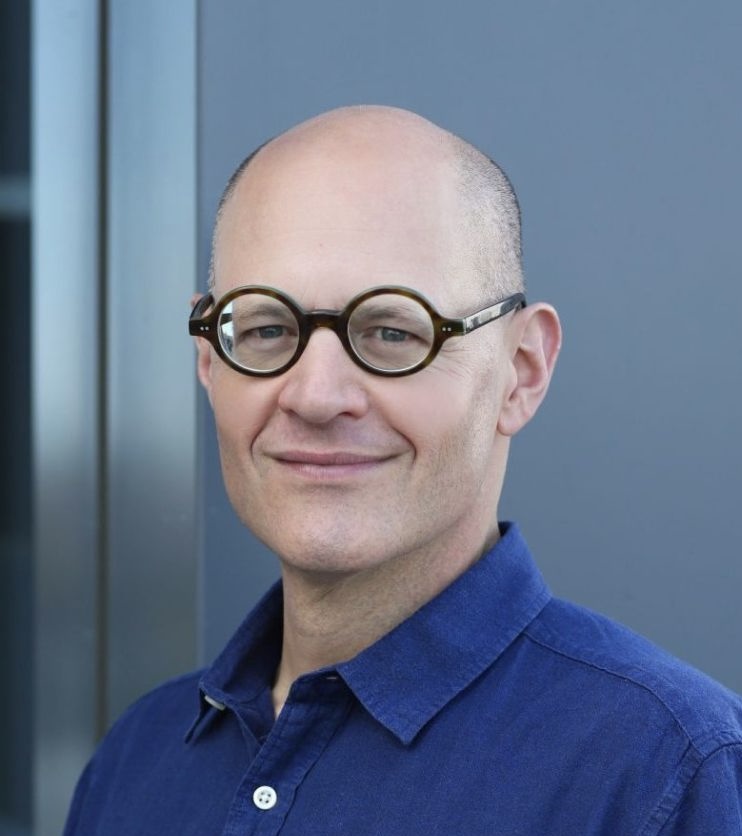
Andrew Seligsohn
2025Andrew Seligsohn has spent decades connecting research to action in pursuit of the common good. He has served as president of Public Agenda since 2021, sharpening Public Agenda’s focus on its mission to bring high-quality, actionable research to people and organizations working to strengthen our democracy. Seligsohn led the development of Public Agenda’s Democracy Renewal Project and has spearheaded a body of work aimed at reinvigorating higher education as a pathway to economic mobility. Seligsohn previously served as president of Campus Compact, a national organization advancing the public purposes of higher education. Before that, he served as Associate Chancellor for Civic Engagement and Strategic Planning at Rutgers University–Camden. Seligsohn also served as Director of Civic Engagement Learning in the Pace Center at Princeton University and as a faculty member in the Department of Political Science at Hartwick College. He holds a PhD in political science from the University of Minnesota and a BA in modern intellectual history from Williams College. And, in high school, Andrew was among the top debaters in the US.
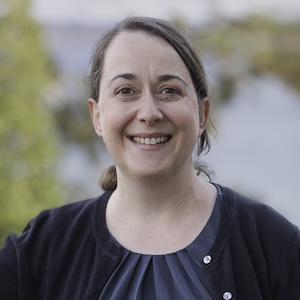
Karen Frost-Arnold
Karen is a Professor of Philosophy at HWS and also a Visiting Associate Professor at the African Centre for Epistemology and Philosophy of Science at the University of Johannesburg. Their research focuses on the philosophy of the internet, the epistemology and ethics of trust, social epistemology, philosophy of science, and feminist philosophy. Their book "Who Should We Be Online? A Social Epistemology for the Internet" was published by Oxford University Press in 2023. They have published articles on Wikipedia, internet anonymity and accountability, online context collapse, internet imposters and tricksters, social media and prejudice, and several articles on the nature of trust. Her talk at the RR is entitled "What Will It Take to Fix Social Media?"
2023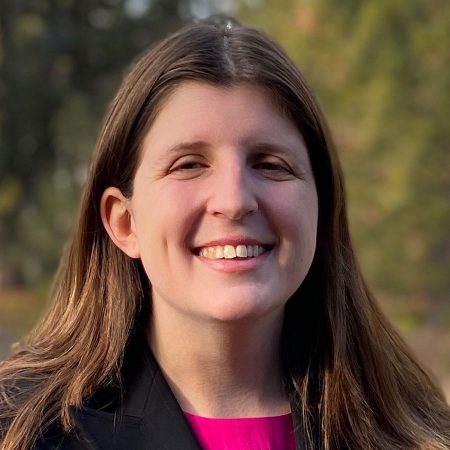
Emma Pierson
2022Emma is an assistant professor of computer science at the Jacobs Technion-Cornell Institute at Cornell Tech and the Technion, and a computer science field member at Cornell University, with a secondary joint appointment as an Assistant Professor of Population Health Sciences at Weill Cornell Medical College. She develops data science and machine learning methods to study two broad areas: inequality and healthcare. She has recently published papers on inequality in pain (Nature Medicine, 2021), inequality in policing (Nature Human Behaviour, 2020), and inequality in COVID-19 (Nature, 2020), as well as numerous articles in the Washington Post, the Atlantic and the New York Times. Emma was a Rhodes scholar and also a highly successful BP debater at Stanford who published important work about the gender gap in speaker scores and about the surprisingly small influence of Round 1 at the WUDC.
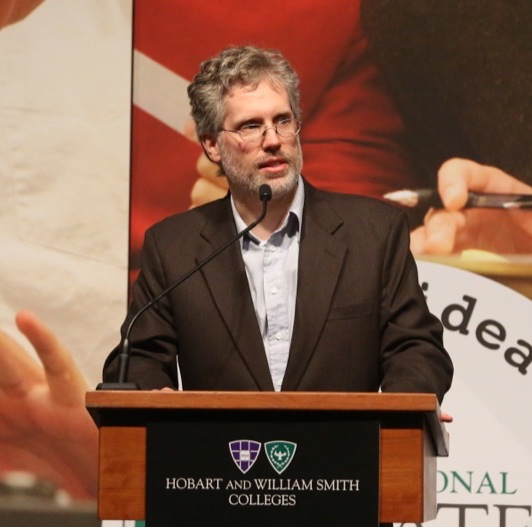
Eric Barnes
2019Eric teaches philosophy and coaches debate at HWS. In 2007, he held the first round robin debate tournament in the BP format. His research concerns the intersection of game theory and ethics. He has also published extensively about debating. In 2011, he published an article with Steven Johnson and Andy Hume, where he argued in favor of expanding the break at Worlds to 48 teams. In his talk at the 2019 RR, Eric introduced a new approach to scoring BP debate tournaments that used tapered point assignments to increase both accuracy and fairness. A copy of the PowerPoint presentation can be found here. A more developed version of these ideas will be published in the near future, and the 2020 HWS IV will likely be run using a new point system.
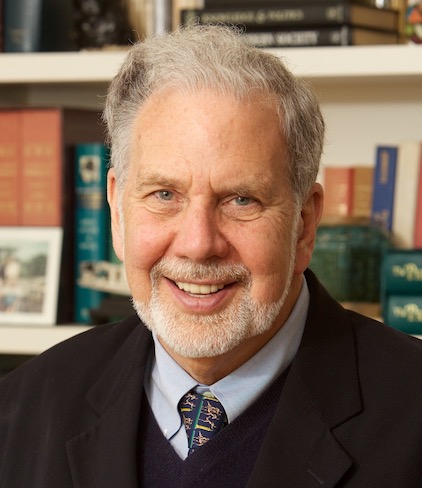
John Sexton
2018John was President of New York University from 2002 to 2015 and Dean of the NYU School of Law from 1988 to 2002. He expanded NYU internationally (with new campuses in Abu Dhabi and Shanghai) and in NY City (with dramatic plans for expanding the main campus). From 2003 until 2007, he was the Chairman of the Board of the Federal Reserve Bank of New York. Sexton has a Ph.D. in history and a J.D. from Harvard. He clerked for Supreme Court Chief Justice Warren Burger. From 1961 to 1975, Sexton coached the debate team at St. Brendan's High School (a Catholic girls' school in Brooklyn), leading the team to five national championships. He is in the National Forensic League Hall of Fame, and was recognized by Emory University as one of the top high school debate coach of the past 50 years. Still an avid proponent of interscholastic debate, he is chairman of the board of Associated Leaders of Urban Debate (ALOUD), which seeks to bring debate activities to underserved communities in America's urban areas.
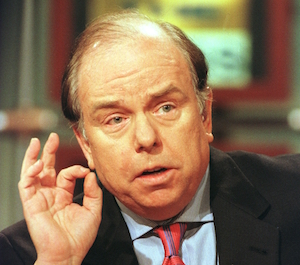
Bob Shrum
2017Robert “Bob” Shrum was senior campaign advisor to Al Gore (2000), John Kerry (2004), Prime Minister Ehud Barak and British Labour Party. He was the principal speechwriter to Senator George McGovern and Senator Ted Kennedy. As a journalist, Shrum's work has appeared in New York magazine, The Los Angeles Times, The New York Times and The New Republic, among other publications. Shrum was a strategist and advertising consultant for thirty winning U.S. Senate campaigns; eight winning campaigns for Governor; and the Mayors of New York, Los Angeles, Chicago, Philadelphia, Denver, Dade County and San Francisco. He has taught at Yale and Boston College, and is now at USC. In 1965, he was named the outstanding debater at the 1965 US National Debate Tournament.
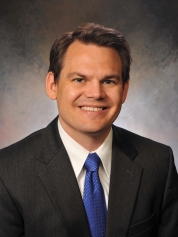
Adam Chilton
2016Adam Chilton is an assistant professor of law at Chicago. Adam's research focuses on using empirical methods to study international and comparative law (e.g., do constitutions and treaties protect human rights). Adam has a BA and MA from Yale, and a JD and PhD in political science from Harvard. In high school, Adam won the national championship in LD debate. In college, Adam is also the only debater to have won all three of the APDA annual awards (NOTY, SOTY and TOTY). During his senior year, he won a record 70 consecutive APDA rounds. In BP, Adam was the top speaker at the Oxford IV and the Cambridge IV, won the Oxford IV, and reached finals at 2010 Worlds in Koc. Adam was also the top speaker and winner of the first HWS Round Robin.
Sophie Richardson
2015Sophie Richardson is the China director at Human Rights Watch and is the author of numerous articles on domestic Chinese political reform, democratization, and human rights in Cambodia, China, Indonesia, Hong Kong, the Philippines, and Vietnam. She has testified before the European Parliament and the US Senate and House of Representatives. Dr. Richardson is the author of the book: China, Cambodia, and the Five Principles of Peaceful Coexistence.
Thomas Tighe
2014Thomas Tighe is the President and CEO of Direct Relief International. Direct Relief has received a 100% fundraising efficiency rating by Forbes, been ranked by the Chronicle of Philanthropy as California's largest international relief organization, and topped Charity Navigator’s 2014 list of “10 of the Best Charities Everyone's Heard Of.”
Larry Summers
2013Larry Summers was the chief economist at the World Bank from 1991 - 1993. He was Secretary of the Treasury for the United States from 1999 - 2001 and was the Director of the National Economic Council from 2009 - 2010. He was also President of Harvard University from 2001 - 2006, and he is now Charles W. Eliot University Professor at Harvard University's Kennedy School of Government.
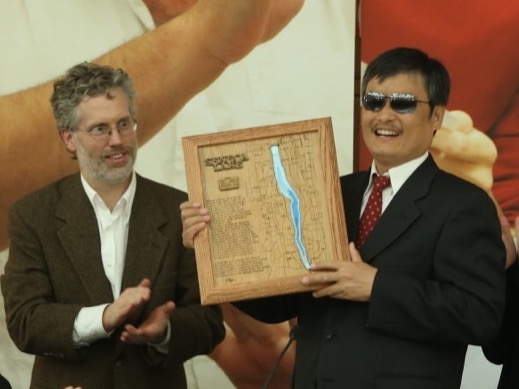
Chen Guangcheng
2013Chen Guangcheng is a human rights activist from China who is concerned with disability rights and the enforcement of China's one-child policy. He was imprisoned in China and then placed under house arrest for an indefinite period. Although he is blind, In April 2012, he escaped house arrest and fled to the US Embassy in Beijing. The US authorities helped to negotiate a deal whereby he and his family were allowed to travel to the US. He is currently studying law at New York University and writing his memoirs.
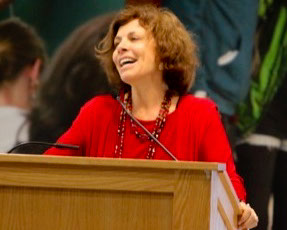
Nadine Strossen
2012Professor Strossen was a former debater who became president of the very influential American Civil Liberties Union, a position that she held from 1991 until 2008. She was the first woman and the youngest person ever to hold this position. Strossen is now a professor of law at New York Law School and sits on the Council on Foreign Relations.
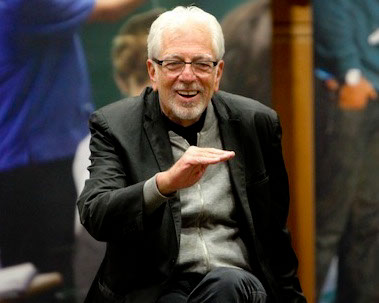
Jules Coleman
2012Professor Coleman holds a PhD. in philosophy and an M.S.L. from Yale Law School. He hold a joint appointment at Yale Law School and at Yale's University's department of philosophy. His area of expertise are He teaches classes at Yale on philosophy of law; torts; law, language and truth; political philosophy; and rational choice theory. In 1998, he delivered the Clarendon lecture at Oxford University.
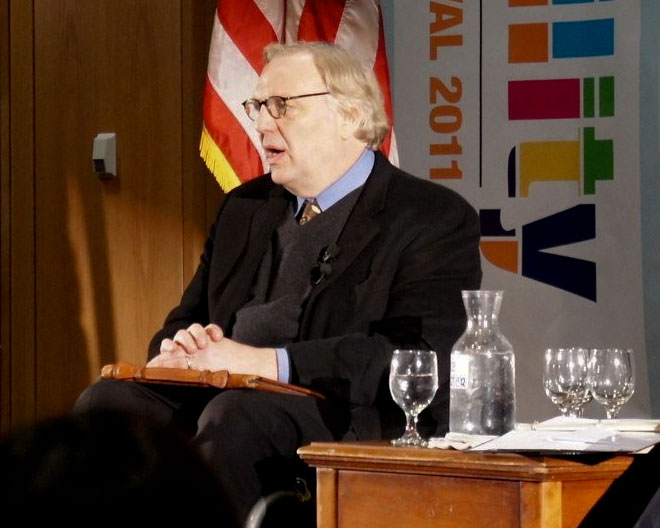
John Hockenberry
2011John Charles Hockenberry (born June 4, 1956) is an American journalist and author. A four-time Emmy Award winner and three-time Peabody Award winner, Hockenberry has worked in media since 1980.
-
Meals & Parties
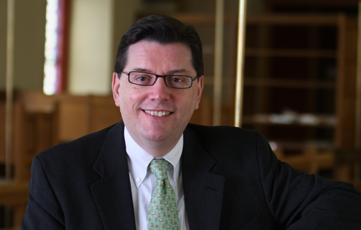
President's House
The official opening of the RR is dinner on Thursday night. This dinner is usually hosted by the President of HWS, often at his beautiful home on campus
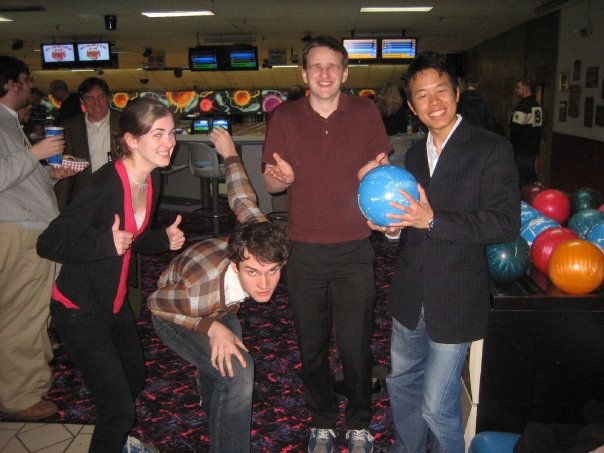
Night on the Town
Although it is not an official part of the RR, the members of the HWS Debate Team invariably entertain our guests on Thursday night after dinner. Activities might include a party on campus, going bowling or a pub crawl around Geneva. The point is to show our guests a good time.
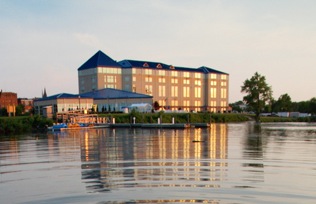
Breakfast at the hotel
Most RR guests have breakfast at the hotel, which may be included in your room charge, depending on your choice when booking the room.
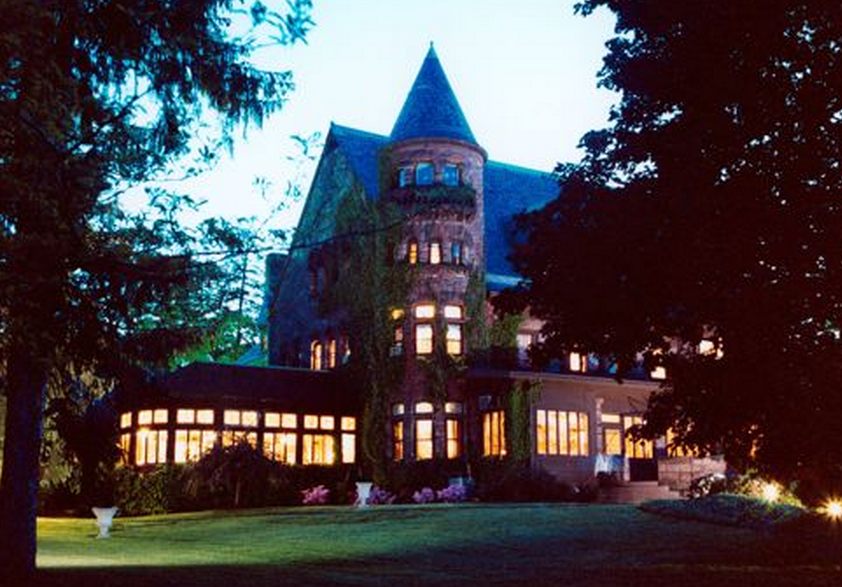
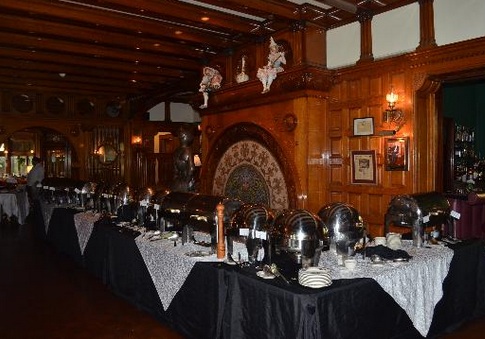
Registration Lunch at Belhurst
Registration (such as it is) for the RR is held over lunch on Friday at the stunning restaurant in Belhurst Castle, just a mile south of campus. Enjoy a great meal before the tournament begins.
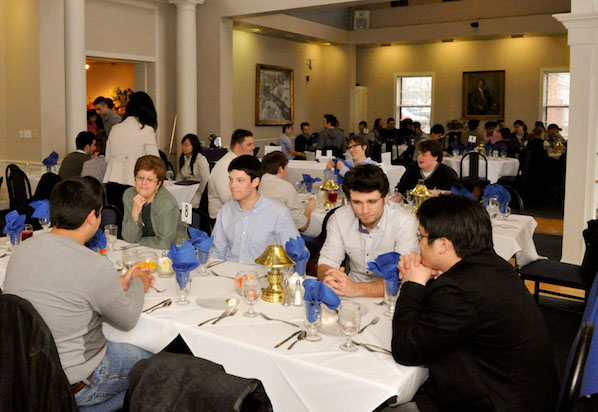
Friday Dinner at the Faculty Dining Room
After the keynote speaker, Friday’s dinner is hosted by the Provost and held in the Faculty Dining Room. This is a great time to meet new people, including a few distinguished faculty from HWS who are invited by our team each year.
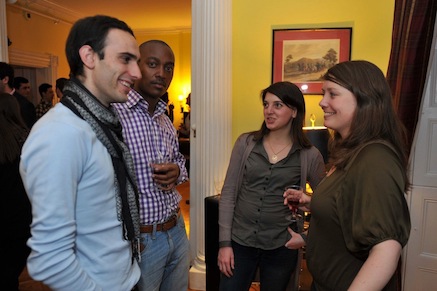
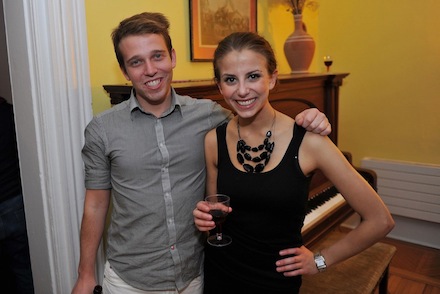
Wine Tasting Party
At the end of the day on Friday, debaters and judges are invited to unwind at an elegant wine tasting party on campus. Guests are welcomed by hot hors d’oeuvres and an array of the local wines that have made our Finger Lake region a destination for wine tourism and other excellent beverages.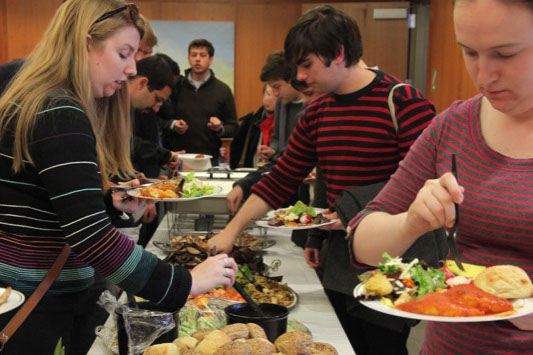
Saturday Lunch Buffet
Lunch on Saturday is a tasty buffet between rounds 4 and 5. Catered by Club 86, it features numerous freshly prepared dishes that will please people with pretty much any taste in food.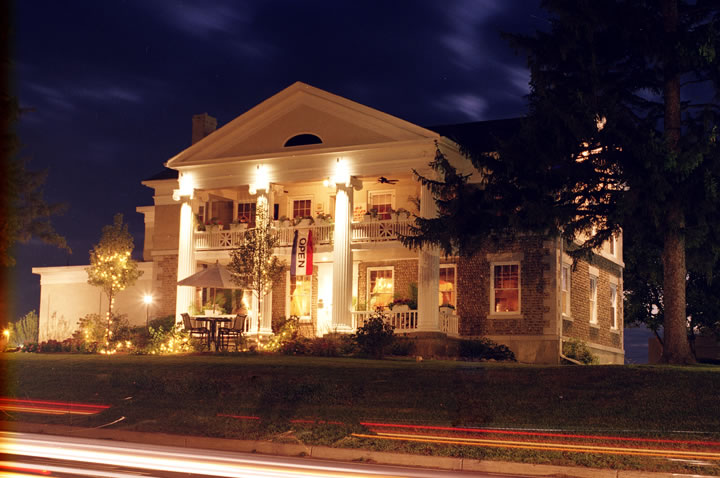
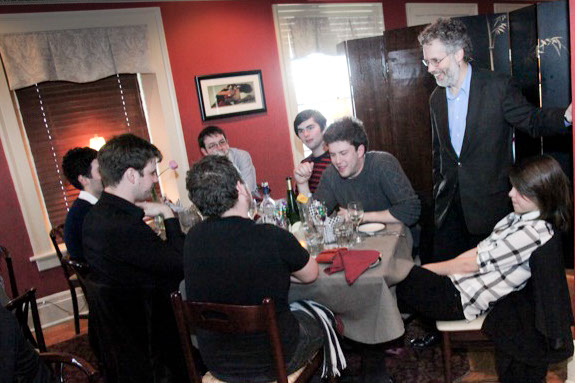
Awards Banquent at the Cobblestone
After the final round, the RR awards banquet has always been held at The Cobblestone restaurant. We keep coming back because everyone loves it here. The atmosphere is warm and friendly, and food is great.Saturday Night Social
Later on Saturday night, guests usually gather somewhere to share stories, rehash rounds and pore over the tab. This after-party is not actually put on by us, but it is seen by some as a highlight of the weekend. -
Excursions
NIAGARA FALLS
The main excursion of the RR is a trip to Niagara Falls for those who arrive early enough. We have lunch at the Seneca Niagara Casino and then go on to spend a leisurely time walking between Horseshoe Falls and American Falls, and then walking over the Niagara river to the observation deck, which provides an excellent perspective on the whole area. Niagara Falls is one of the great natural wonders of the world. It is well worth the trip. (The bus for this excursion departs HWS at 9:00 on Thursday morning and then picks up people flying into Buffalo airport. We leave BUF airport at 11:30, then go to lunch and see the falls. The bus arrives back at HWS at about 5:00, in time for people to check into their rooms and then get to the opening dinner.)
-
Affiliated Tournaments
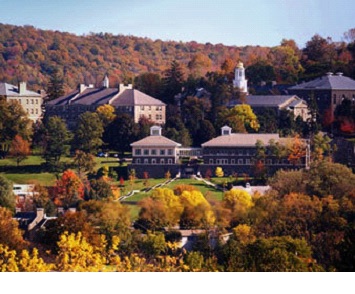
The Colgate IV is traditionally held on the weekend prior to the Round Robin, while the US UDC is traditionally held on the following weekend. It is typical for teams who are flying in for the Round Robin to attend one or both of these affiliated tournaments. In between the tournaments, people usually travel to New York City, Washington D.C. or other places of interest in the Northeast. Colgate is less than 2 hours drive from HWS, so it is very convenient. They run an excellent tournament attracting many of the best US and Canadian team, as well as teams flying in for the RR. Sometimes they even use the same CA as the Round Robin.
The US UDC is in a different place each year. Teams should check with the host of the US UDC about rules for international registration and whether international teams are permitted to break.
-
Qualifying: How to be Part of the Round Robin
How to Get an Invitation
Two Ways to Qualify
Because of the unique format of this tournament, we need exactly 16 teams to attend. To ensure that we get just that number, we've devised a two pronged system. There are sixteen teams who, based on a specific accomplishment, will receive automatic invitations to the tournament. Those not earning an automatic bid are encouraged to apply for an “at-large bid”. (Applications for at-large places are due January 31.)Automatic bids go to the winners of the following tournaments:
Asian BP ChampionshipCambridge IVCambridge Women'sEuropean UDCHart House IVNorth American UDCOxford IVPan African UDCSydney MiniUnited AsiansUS UDCYale IV... and all 4 teams in the Grand Final Round of Worlds* We recognize that this list may make some people unhappy, but we want to assure you that we took this very seriously and had extensive consultation with our advisory board. We do not intend this to be a list of the best tournaments in the world, whatever that might mean. Rather, it seemed to us that this list best allowed us to accomplish the goals outlined in our vision statement.
First Alternate Bid: The winner of the HWS IV will be awarded a first alternate bid. In other words, if not all 16 auto-bid spots are taken, the winner of the HWS IV will be automatically invited to the RR.
At-large applications will be reviewed in early February and selections announced by February 14. Applications will be reviewed by the selections committee, in consultation with members of the advisory board where appropriate. Selections will be made on the basis of the mission of the tournament, which includes consideration of both skill and diversity.
All applications for an at-large bid should be submitted via online form, which will be posted to the HWS RR Facebook group. Contact (barnes@hws.edu) if you have questions. These should include:
Applications are due by January 31
Rules for automatic bids
An automatic bid qualifies the debaters on the team that earned it, not the school that they attend. At least one member of the team attending the RR must have been on the team that earned the automatic bid. Both members of the team must have been students at the same institution during the prior calendar year. Late changes to registration by automatic bid teams will be permitted, as long as these requirements are still met. Schools are not limited to one team, but obviously one automatic bid can only be used once. To reserve their place at the Round Robin, they will be required to send in their registration fee, to be received no later than January 20. -
Dates and Deadlines
December 15
Notification will be sent to all automatic qualifiers (aside from those at Worlds) by this date.
January 20
Automatic qualifier teams wishing to attend the Round Robin must ensure that payment is RECEIVED at HWS by this date.
January 31
Those applying for an at-large invitation to the Round Robin must ensure that all of their application information is RECIEVED at HWS by this date.
February 14
At-large applicants will be notified by this date about the status of their application.
7 Days After Being Invited
At-large invitees must ensure that payment of their full registration fee is received at HWS by this date. After this their spot may be given to another team. -
Cost and Financial Aid
COSTS
Registration for the tournament costs per team change each year.
Registration for each judge is $90.
Registration for observers is $50. (Does not include dinners.)Financial Assistance
Our goal is to enable all qualified teams to attend. We will do our best to offer assistance to any teams who are unable to pay for the costs of travel and registration. In order to make the most of our limited resources, we will direct our funds to teams who do not have the money, rather than to teams who would rather not spend the money. All financial aid will be distributed at the tournament, and cannot be offered in advance. The registration fee for teams cannot be waived, and must be paid by the deadline to reserve a place. Because we need exactly 16 teams, it is very important for us to have some tangible assurance that teams are committed to attending, which the registration fee provides. Please contact us if you have questions about financial assistance.Travel Cost
- As a general matter, financial aid is only considered to teams traveling from a great distance (e.g., India, Southern Africa, Australia), not teams with shorter flights.
- All requests for financial aid must be received by January 31.
- Due to our limited financial aid budget, we often must give preference to teams who request less aid.
- Our maximum financial aid grant is $500 per team (though most teams who are offered aid get less than the maximum grant).Reimbursement
- Ideally, subsidies will be distributed at the registration lunch for the RR. They cannot be given before this.
- In order to get a subsidy at this time, proper documentation of expenses and other required information (e.g., mailing addresses for each debater) must have been sent to HWS two weeks ahead of time.
- If the subsidy has not been processed by the time of registration, a check for the subsidy will be mailed to the participants.
- A team's registration fee for the RR cannot be waived under any circumstance. -
What's Included in Registration
- • Shuttle service to and from Syracuse airport (SYR) or the Syracuse train & bus station for overseas teams
- • Excursion to Niagara Falls (optional)
- • Dinner reception on the arrival night
- • Gourmet lunch at on Saturday and Sunday
- • Keynote dinner hosted by the Provost in the Faculty Dining Room
- • Keynote speaker on day 1
- • Wine tasting party featuring a variety of local wines and other treats
- • Shuttle service from the tournament hotel to the campus during the whole tournament
- • Formal awards dinner after finals
-
Flights & Hotel

BOOKING FLIGHTS
Before you buy plane tickets, we STRONGLY encourage you to contact us (barnes@hws.edu) to discuss your plans. The airport that we use most frequently is Syracuse (SYR), but other airports may work better depending on your travel plans. We cannot promise to provide local transportation to airports or train stations if you do not clear your travel plans with us in advance.TOURNAMENT HOTELS (Geneva, NY)
The tournament hotel will generally be either the Fairfield Inn or the 41 Lakefront Hotel. You should ask before booking a room, or check the RR Facebook page, where this kind of change will be announced.
OTHER HOTELS
There are other hotels in Geneva, some marginally less expensive than these and some much more expensive. Our view is the less expensive hotels are not nearly as nice and so we recommend that people stay at the tournament hotel. Our tournament shuttles will not serve hotels other than the tournament hotel. -
Past Winners
2024
Champions:
Second Place:
Finalist:
Finalist:
Cambridge/Stanford (Kumar & Subramaniam)
Chicago/Sydney (Dhar & Stephanson)
Chicago/Princeton (Kodnoni & Lu)
McGill (Rosen & Yan)
1st Speaker:
2nd Speaker:
3rd Speaker:
Honored Judge:
Tejas Subramaniam
Max Rosen
Ashish Kumar
Hamza Tariq Chaudhry2023
Champions:
Second Place:
Finalist:
Finalist:
Stanford (Arthur Lee & Tejas Subramaniam)
LSE (Caito & Elsammak)
Princeton (Cape & Lu)
Princeton (Metzinger & Weaving)
1st Speaker:
2nd Speaker:
3rd Speaker:
Honored Judge:
Tejas Subramaniam
Xiao-ke Lu
Jane Metzinger
Brent Schmidt2022
Champions:
Second Place:
Finalist:
Finalist:
McGill (Naomi Panovka & Max Rosen)
Oxford (O'Nunain & Sherry)
Harvard (Chaudhry & Dhar)
Princeton (Lu & Weaving)
1st Speaker:
2nd Speaker:
3rd Speaker:
Honored Judge:
Hamza Tariq Chaudhry
Rachel O'Nunain
Aditya Dhar
Jason Xiao2021
Champions:
Second Place:
Finalist:
Finalist:
Zagreb (Tin Puljić & Lovro Šprem)
LSE (Bathula & Sewell)
Ateneo (Africa & Alcaneses)
Harvard (Dhar & Spector)
1st Speaker:
2nd Speaker:
3rd Speaker:
Honored Judge:
Abhinav Bathula
Trenton Sewell
Tin Puljić
Hadar Goldberg2020
Champions:
Second Place:
Finalist:
Finalist:
Yale (David Edimo & Eva-Marie Quinones)
Cambridge (Arce & Musat)
Harvard (Dhar & Nehme)
IBA Dhaka (Khandaker & Paul)
1st Speaker:
2nd Speaker:
3rd Speaker:
Honored Judge:
Lucía Arce
Sajid Khandaker
Ignacio Villareal
Niki Linganur2019
Champions:
Second Place:
Finalist:
Finalist:
Oxford (Kit Mercer & Jason Xiao)
Melbourne (Dixon & O'Brien)
Harvard (DeBois & He)
Harvard (Hunt & Nehme)
1st Speaker:
2nd Speaker:
3rd Speaker:
Honored Judge:
Danny DeBois
Stuart Dixon
Connor O'Brien
Dan Lahav2018
Champions:
Second Place:
Finalist:
Finalist:
Cambridge (Alasdair Donovan & Ian Wu)
Oxford (Lee & Xiao)
Stanford (Elliott & Leet)
Tel Aviv (Dahan & Manor)
1st Speaker:
2nd Speaker:
3rd Speaker:
Honored Judge:
Lee Chin Wee
Alasdair Donovan
Ian Wu
Cliodhna Ní Chéileachair2017
Champions:
Second Place:
Finalist:
Finalist:
Tel Aviv (Dan Lahav & Sella Nevo)
Harvard (DeBois & Hall)
Cornell (Lee & Muttalib)
Yale (Lynyak & Zhang)
1st Speaker:
2nd Speaker:
3rd Speaker:
Honored Judge:
Danny DeBois
Sella Nevo
Dan Lahav
Alexandra Sundarsingh2016
Champions:
Second Place:
Finalist:
Finalist:
Cambridge (Michael Goekjian & Ashish Kumar)
Tel Aviv (Hayut-Man & Lahav)
Cambridge (Clay & Lim)
Yale (Nguyen & Zhang)
1st Speaker:
2nd Speaker:
3rd Speaker:
Honored Judge:
Michael Dunn Goekjian
Ashih Kumar
George Clay
Buzz Klinger2015
Champions:
Second Place:
Finalist:
Finalist:
Hart House (Veenu Goswami & Joe McGrade)
Cambridge (Goekjian & Kumar)
Hart House (Flynn & Sundarsingh)
Harvard (Mashwama & Seo)
1st Speaker:
2nd Speaker:
3rd Speaker:
Honored Judge:
Michael Dunn Goekjian
Ashih Kumar
Veenu Goswami
Sesenu Woldemariam2014
Champions:
Second Place:
Finalist:
Finalist:
Sydney (Chris Bisset & Daniel Swain)
Yale (Bakal & Cugini)
Cambridge (Kumar & ParkerBrooks)
Cambridge (Goekjian & Powell)
1st Speaker:
2nd Speaker:
3rd Speaker:
Honored Judge:
Daniel Swain
Kitty ParkerBrooks
Chris Bisset
Jonathan Leader Maynard2013
Champions:
Second Place:
Finalist:
Finalist:
Lincoln's Inn (James Hardy & Harish Natarajan)
Cornell (Blackman & Bores)
Loyola Marymount (Kilkup & Molison)
Yale (Connery & Ward-Packard)
1st Speaker:
2nd Speaker:
3rd Speaker:
Honored Judge:
Harish Natarajan
James Kilcup
Kieran Bunn
Monica Ferris2012
Champions:
Second Place:
Finalist:
Finalist:
Stanford (Michael Baer & Shengwu Li)
Oxford (Jones & Woolgar)
Sydney (Bowes & Karp)
Yale (Cugini & Kornfeld)
1st Speaker:
2nd Speaker:
3rd Speaker:
Honored Judge:
Ben Woolgar
Michael Baer
Shengwu Li
Mary Nugent2011
Champions:
Second Place:
Finalist:
Finalist:
Stanford (Alexander Campbell & Anish Mitra)
Oxford (Bell & Woolgar)
Hart House (Goswami & Penner)
MIT (Goldstein & McKee)
1st Speaker:
2nd Speaker:
3rd Speaker:
Honored Judge:
Ben Woolgar
Stephanie Bell
Alexander Campbell
Stephen Boyle2010
Champions:
Second Place:
Finalist:
Finalist:
TCD L&H (Niamh Ni Mhaoileoin & Niall Sherry)
Queen's (Hetherington & Wadsworth)
Cornell (Bores & Yeh)
Sydney (Cowell & Mooney)
1st Speaker:
2nd Speaker:
3rd Speaker:
Honored Judge:
Tim Mooney
Bronwyn Cowell
Jack Watson
Michael Kotrly2009
Champions:
Second Place:
Finalist:
Finalist:
Oxford (Jonathan L. Maynard & Alex Worsnip)
Hart House (Freeman & Lizius)
Loyola Marymount (Kiley & Schwab)
Middle Temple (Cochran & Warents)
1st Speaker:
2nd Speaker:
3rd Speaker:
Honored Judge:
Jonathan Leader Maynard
Alex Worsnip
Doug Cochran
Josh Martin2008
Champions:
Second Place:
Finalist:
Finalist:
Harvard (Cormac Early & Lewis Bollard)
Claremont (Sprague & Wohlschlegel)
Hart House (Ashbourne & Levy)
Oxford (Turner & Worsnip)
1st Speaker:
2nd Speaker:
3rd Speaker:
Lewis Turner
Alexander Levy
Alex Worsnip2007
Champions:
Second Place:
Finalist:
Finalist:
Yale (Adam Chilton & David Denton)
Harvard (Early & Ewalt)
Harvard (Bollard & Haque)
McGill (Grek & Patton)
1st Speaker:
2nd Speaker:
3rd Speaker:
Adam Chilton
David Denton
Cormac Early
-
Round Robin Origins
In 2006 at Dublin Worlds, people from HWS were talking to some new friends from Ireland and discussing that although Worlds provided great competition each year, it was an enormous event and so was a little impersonal. We noticed there was no tournament of champions in BP just for the elite teams, and we started to think about what such a tournament would look like. After a little bit of work sitting around between rounds at the Hart House IV, we figured out that a round robin tournament was actually possible in a 4 team format. After that, our team decided that we would start the HWS Round Robin at the end of our school year in 2007.The first year (2007) drew some excellent teams from the Northeast US and one team from Canada, but the judging was done mostly by members of the HWS team. Invitations were sent to schools we knew who did BP and had some decent debaters.
The second year (2008) began our partnership with IDEA. More Canadian teams showed up this year, as well as some teams from the west coast and a team from Oxford. We also began more active recruiting to diversify and improve the judging pool.
The third year (2009) is when the RR truly became worthy of being called an international tournament of champions. This was the first year that we instituted the automatic and at-large bid process for invitations. As a result, we had teams from the US, Canada, England, Israel, South Africa and India. Over half of the teams were from outside the US and the competition and judging were uniformly excellent. Neill Harvey-Smith served as our first invited CA. We also partnered with the US UDC for the first time.
The fourth year (2010) built on the success of the previous year. The sixteen teams came from eight nations (including Australia) and we had enough people in the judging pool who had broken as a judge at Worlds to cover all our rounds. Logan Balavijendran served as the CA and we partnered with the Colgate IV for the first time.
The fifth year (2011) had fifteen nations represented at the RR. Eight of the sixteen teams that attended were there using an automatic bid, making competition for the remaining at-large spots more difficult than ever before. The CA was Leela Koenig and we began having invited speakers this year.
The sixth year (2012) was generally considered to be our most competitive year to that point. With ten automatic bid teams and eleven international teams, there were no soft teams. One team (the eventual winners) even scored two 90s in a single round. The CA was Doug Cochran and we listened to two exceptional speakers, Jules Coleman and Nadine Strossen.
In the years since then, the RR has continued to grow in prestige and quality, attracting great teams, judges and guest speakers. Our seventh year (2013) turned out to be our last year of funding from IDEA and the Open Society Foundations, but we were very happy that after our 2014 tournament, no one even seems to have noticed, thanks to the generosity of the HWS President's Office. We have always seen our goal as creating an event that generates the highest level of debate with internationally diverse competitors in an intimate, friendly and elegant environment. The debates we see ask serious questions about personal, social and international issues, with an eye toward deepening our understanding of these. We hope that we have succeeded in the past and we aim to continue this success into the future.
Beginning in 2014, we have used the RR as a sort of laboratory for understanding debating and judging. In 2014, we conducted a study (published in the Monash Debating Review) that examined the difference between decisions reached by highly experienced judging panels and panels of well-educated judges who had no previous exerience with competitive debating. In 2016, the RR will run a study based on having two independent panels of top tier judges in every round, with both panels decisions counting and both delivering independent decisions.
-
Historical Committee Membership
Motions Committee
Amelia McLeod
Anne Valkering
Arinah Najwa
Archie Hall
Chris Bisset
Colm Flynn
Daniel Berman
Doug Cochran (2)
Fiona Prowse
James Leeder
Jasmine Ho Abdullah
Joe Roussos (2)
Josh Zoffer
Leela Koenig (2)
Logan Balavijendran (3)
Madeline Schultz (2)
Mary Nugent
Michael Baer
Michael Dunn Goekjian (2)
Neill Harvey-Smith (2)
Pam Cohn
Paul Smith
Sarah Balakrishnan
Sharmila Parmanand (5)
Steve Johnson (3)
Steven Penner (4)
Syed Saddiq
Tasha Rachman
Veenu Goswami
Selections Committee
Abbey McCarthy
Alex Deane
Anne Valkering
Ashish Kumar
Bobbi Leet
Chris Bisset
Colm Flynn (2)
Dan Lahav
Daniel Berman
Daniel Swain
Danique Van Koppenhagen
Enting Lee
Fanele Mashwama
Harish Natarajan
Jasmine Ho
Joe Roussos
John McKee
Leela Koenig (3)
Logan Balavijendran
Mary Nugent
Michael Baer
Michael Shapira
Omer Nevo
Pam Cohn
Paul Karp
Sam Block (2)
Sayeqa Islam
Sharmila Parmanand (2)
Steve Hind
Steve Johnson
Steven Penner (4)
Yashodhan Nair
Advisory Committee
Colm Flynn
Dan Corder
Helina Loor
Ian Lising
Jason Jarvis
Joe Roussos
Logan Balavijendran
Monica Ferris
Naomi Oreb
Nick Cugini
Noel Selegzi
Paul Karp
-
Videos (final rounds are posted here)
Many videos of preliminary rounds are on our YouTube channel.
2020
Motion: This house believes that individuals have a moral obligation to not have biological children.
OG: Yale (Edimo/Quinones)
OO: IBA Dhaka (Khandaker/Paul)
CG: Cambridge (Arce/Musat)
CO: Harvard (Dhar/Nehme)
2019
Motion: This house believes that the Black Lives Matter movement should embrace open carry gun laws and engage in armed community patrols.
Info Slide: The Black Panthers began as a group of black citizens in Oakland, California who engaged in armed patrols of the city streets, specifically focusing on observing police. In response, California enacted much stricter gun control legislation.
OG: Harvard (Hunt/Nehme)
OO: Oxford (Mercer/Xiao)
CG: Harvard (DeBois/He)
CO: Melbourne (Dixon/O'Brien)
2018
Motion: This house believes that the interests of the Chinese people would be better served by a peaceful transition into a democracy, rather than a continuation of the one party rule.
OG: Cambridge (Donovan/Wu)
OO: Tel Aviv (Dahan/Manor)
CG: Stanford (Elliott/Leet)
CO: Oxford (Lee/Xiao)
2017
Motion: This house believes that governments should abandon the strategy of "decapitation" in fighting terrorism.
Info Slide: In the context of anti-terrorism, "decapitation" refers to the strategy of targeting terrorist leaders for assassination.
OG: Yale (Nguyen/Zhang)
OO: Cornell (Lee/Muttalib)
CG: Harvard (DeBois/Hall)
CO: Tel Aviv (Lahav/Nevo)
2016
Motion: This house supports health insurance companies offering optional lump sum payments to terminally ill patients who choose to forgo expensive life extending medical treatments.
OG: Cambridge (Clay/Lim)
OO: Yale (Nguyen/Zhang)
CG: Tel Aviv (Hayut-Ma/Lahav)
CO: Cambridge (Goekjian/Kumar)
2015
Motion: This house believes that prominent civil society activists should choose not to run for elected office.
OG: Cambridge (Goekjian/Kumar)
OO: Harvard (Mashwama/Seo)
CG: Hart House (Flynn/Sundarsingh)
CO: Hart House (Goswami/McGrade)
2014
Motion: This house believes that, within broad budgetary constraints, environmental policy should be decided by unelected scientific experts selected by their peers.
OG: Cambridge (Goekjian/Powell)
OO: Yale (Bakal/Cugini)
CG: Sydney (Bisset/Swain)
CO: Cambridge (Kumar/ParkerBrooks)
2013
Motion: This house would use diversity quotas for university admissions.
OG: Lincoln's Inn (Hardy/Natarajan)
OO: Yale (Connery/Ward-Packard)
CG: Cornell (Blackman/Bores)
CO: Loyola Marymount (Kilcup/Molison)
2012
Motion: This house believes that the government should subsidize newspapers.
OG: Sydney (Bowes/Karp)
OO: Stanford (Baer/Li)
CG: Yale (Cugini/Kornfeld)
CO: Oxford (Jones/Woolgar)
2011 ... (Searching for real video)
Motion: This house believes that whenever individuals have a choice between spending money on luxuries or donating it to ameliorating suffering, morality demands donating.
OG: Hart House (Goswami/Penner)
OO: MIT (Goldstein/McKee)
CG: Oxford (Bell/Woolgar)
CO: Stanford (Campbell/Mitra)
2010
Motion: This house would ban parents from genetically selecting children who lack a predisposition to homosexuality.
OG: Trinity Dublin (Mhaoileoin/Sherry)
OO: Cornell (Bores/Yeh)
CG: Sydney (Cowell/Mooney)
CO: Queen's (Heatherington/Wadsworth)
2009
Motion: This house would eliminate executive pardons.
OG: Hart House (Freeman/Lizius)
OO: Middle Temple (Cochran/Warents)
CG: Oxford (Maynard/Worsnip)
CO: Loyola Marymount (Kiley/Schwab)
2008
Motion: This house would establish an international force to arrest those indicted by the International Criminal Court.
OG: Harvard (Bollard/Early)
OO: Oxford (Turner/Worsnip)
CG: Claremont (Sprague/Wohlschlegel)
CO: Hart House (Ashbourne/Levy)
2007
Motion: This house supports requiring community service for graduation from high school.
OG: McGill (Grek/Patton)
OO: Harvard (Bollard/Haque)
CG: Harvard (Early/Ewalt)
CO: Yale (Chilton/Denton)
